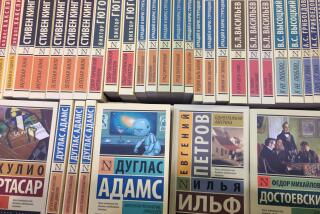Russia’s soft spot for Stalin
- Share via
To many of those who remember Ronald Reagan’s presidency, his latter-day popularity is a little puzzling.
The Republican icon, who like George W. Bush produced skyrocketing federal deficits by advocating tax cuts even as he hiked military spending and -- also like Bush -- promoted laissez-faire regulatory policies that culminated in a home-loan crisis, is today so widely admired that even Democrats such as President Obama frequently praise him.
But if Americans’ perceptions of Reagan are puzzling, Russians’ perceptions of Josef Stalin are downright bizarre.
On Monday, hundreds of admirers of the former Soviet leader lined up in Moscow’s Red Square to lay wreaths at his grave, in honor of the 130th anniversary of his birth.
Ivan Melnikov of Russia’s Communist Party, the deputy parliament speaker, wrote on his party’s website, “We would very much like for any discussion of the mistakes of the Stalin epoch to be silenced today, so that people can reflect on Stalin’s personality as a creator, a thinker and a patriot.”
Not to mention a genocidal maniac. The “mistakes” Melnikov would prefer not to discuss include a treacherous pact to divide Europe with Adolf Hitler, as well as bloody purges and engineered famines that killed tens of millions of Russians and rank high among the worst atrocities of the 20th century.
Stalin’s cult of personality has been strengthening for nearly a decade, with open support from the Kremlin. So popular is the Gardener of Human Happiness (one of Stalin’s many self-imposed titles) that almost a third of Russians in a recent poll said the country needs a leader like him today. Last year, when state-controlled broadcaster Rossiya TV asked online voters to choose history’s greatest Russian, Stalin was reported to be leading in the polling until organizers threw out the votes and started over, saying the contest had been victimized by a spam campaign. Medieval saint Alexander Nevsky emerged as the winner, though many Russians are convinced the outcome was fixed because a win for Stalin would have been too embarrassing.
It’s widely believed that Russian Prime Minister Vladimir Putin, who recently said Stalin’s legacy is too complex for any black-and-white assessment, is encouraging nostalgia for the dictator in order to build support for his own authoritarian rule.
Like those who aim to canonize Reagan, he has some big advantages: The subject being reinvented is no longer around to demonstrate his many flaws, and memories are short.
More to Read
Sign up for Essential California
The most important California stories and recommendations in your inbox every morning.
You may occasionally receive promotional content from the Los Angeles Times.










